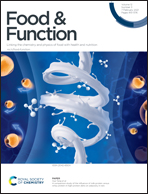Effects of microfluidization and thermal treatment on the characterization and digestion of curcumin loaded protein–polysaccharide–tea saponin complex nanoparticles†
Abstract
Microfluidization (50–150 MPa) and thermal treatment (45–85 °C) were applied to modulate the physicochemical stability, molecular interaction and microstructure of zein–proplyene glycol alginate (PGA)–tea saponin (TS) complex nanoparticles for delivery of curcumin. The size of these complex nanoparticles was decreased from 583.1 to 267.4 nm as the microfluidization pressure was increased from 0 to 100 MPa. In the combined treatment of microfluidization and heating, 100 MPa and 75 °C were the optimum parameters to prepare zein–PGA–TS complex nanoparticles for a better protection of curcumin against various environmental stresses. SEM revealed a synergistic effect of microfluidization and heating on the fabrication of complex nanoparticles with a more uniform size and spherical shape. During in vitro gastrointestinal digestion, the complex nanoparticles showed an excellent gastric stability and a sustained release of curcumin in the small intestinal phase. These findings interpreted the effects of microfluidization and thermal treatment on the functional properties of protein–polysaccharide–surfactant complex nanoparticles that can be utilized to develop food grade nanoparticles with enhanced stability and controllable digestion behaviour.



 Please wait while we load your content...
Please wait while we load your content...